小六英语第7讲:连词(学生版)
小学英语连词成句的方法

小学英语连词成句的方法连词成句的方法一、看清标点符号。
如果是句号,则是陈述语句。
陈述句的基本结构是主语+谓语+宾语。
首先,要在给出的单词中找出主语,如I、you、she、he、it、they、this、that、these、those、there等,把它放在第一位。
然后找谓语动词(包括be动词和实意动词等)。
最后找出宾语。
例如:I have a bar of chocolate.如果是问号,则是疑问语句。
要先看是特殊疑问句还是由be动词或情态动词引导的疑问句。
特殊疑问词常见的有what、where、when、how、how much、how many、how old。
Be动词有is、am、are。
情态动词有can、would、do等。
①如果有where、what、how等疑问词,那么它就是特殊疑问句。
要把疑问词放在句子的最前面,紧接的是be动词,如am、is、are。
例如:What is it?②如果题目中有can、may、shall、would等情态动词,那么它就是由情态动词引导的疑问句。
把情态动词放在句子的最前面,后面紧接的是这句话的主语(主语往往是人或物)。
例如:May I have a new bike?③如果题目中没有任何特殊疑问词,也没有任何情态动词,那么它就是一般疑问句。
一般疑问句的基本准则是疑问词是be动词(am/is/are),要把它们放在句子的最前面,紧接其后的是主语,其他成分也就容易补上去了。
例如:Are you a student?感叹语句通常以感叹号结尾,而我平时最常接触到的是由what和XXX引导的感叹句。
其中,由what引导的感叹句的基本结构是“What + a + adj。
+ n.”。
例如:“What a nice book!”(多漂亮的一本书啊!);“What a beautiful girl!”(多漂亮的一个女孩啊!);“What a big fish!”(好大的一条鱼啊!)。
六年级英语上册Lesson7课件冀教版

sunny
rainy
windy
cloudy
snowy
cold
warm
cool
hot
New words
umbrella
伞;雨伞
Ms.
女士(用于女子的姓氏或姓 名前,不指明婚否)
driver
司机
Li Ming and Jenny go to school.
Good morning!
This is our bus driver, Ms. Scott.
Good morning, Ms. Scott.
Li Ming: Do you always go to school by bus? Jenny: No, sometimes I ride my bike. But I often go to school by bus.
I see the bus stop where we meet, 我看见了我们相遇的那个公交站 The school bus coming down the street. 校车沿着街一直行驶 The driver says, “Good morning! Hi! 司机说:“早上好,嗨! The rain is wet, but we are dry!” 雨是湿的,但我们是干爽的!”
—Yes, I do.是的,我喜欢。 —Does she do her homework?她做作业了吗? —No, she doesn’t. 不,她没有。
在提问或者回答时,助动词选择do还是does,取决于 主语人称的单复数。除第三人称单数(he他,she她, it它)和姓名用does之外,其余都用do。
小学英语语法--连词
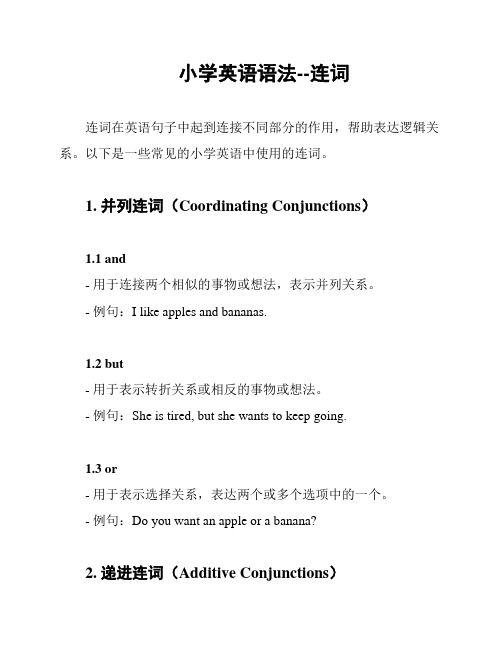
小学英语语法--连词连词在英语句子中起到连接不同部分的作用,帮助表达逻辑关系。
以下是一些常见的小学英语中使用的连词。
1. 并列连词(Coordinating Conjunctions)1.1 and- 用于连接两个相似的事物或想法,表示并列关系。
- 例句:I like apples and bananas.1.2 but- 用于表示转折关系或相反的事物或想法。
- 例句:She is tired, but she wants to keep going.1.3 or- 用于表示选择关系,表达两个或多个选项中的一个。
- 例句:Do you want an apple or a banana?2. 递进连词(Additive Conjunctions)2.1 also- 用于添加类似的事物或想法。
- 例句:She speaks English, and she also speaks French.2.2 furthermore- 用于提供更多信息或进一步解释。
- 例句:He is good at math. Furthermore, he excels in science.3. 转折连词(Concessive Conjunctions)3.1 although- 用于表示尽管某个条件存在,但结果与之相反。
- 例句:Although it was raining, we still went outside.3.2 however- 用于表示对前面说法的转折或相反观点。
- 例句:I wanted to go to the concert; however, I couldn't find tickets.4. 原因连词(Causal Conjunctions)4.1 because- 用于表示原因或解释。
- 例句:He couldn't go to the party because he was sick.4.2 so- 用于表达前因后果的关系。
六年级英语第7讲讲义

primary /ˈpraɪm ər ɪ/ adj. 初级的,初等的;小学的I love my primary school.middle /ˈm ɪdl/ adj. 中部的;中等的;中间的But I’m going to a middle school soon.speech /spiːtʃ/ n. 演说;讲演 So I want to make a speech to my classmates.future/ˈfjuːtʃə(r)/ n. 未来,将来 “We may go to different schools in the future.”happiness/ˈhæp ɪn əs/ n. 幸福,快乐 “But you will always be a reason for my happiness.”课堂练习1. Jack is 10 years old. He is a(n) _____ school student.A. surprisedB. primaryC. interested 2. Leo is fifteen years old. He is a _____ school student.A. cloudyB. middleC. primary3. Tom is good at giving _____.A. speechesB. mistakesC. space4. People will live longer in the _____.A. laterB. travelC. future5. The man found his _____ by staying with his family.A. happinessB. happyC. happyness6. My brother is a _____ school student.A. middleB. wishC. excited【搭配】primary school 小学【搭配】middle school 初中【搭配】give/make a speech 发表演讲【搭配】in the future 在将来【拓展】happy adj. 快乐的,高兴的7.After _____ school, students will enter the middle school.A. primaryB. middleC. small8.He is too shy to give a _____ in public.A. speechB. wishC. happiness9.I want to be a doctor in the _____.A. primaryB. middleC. future10.Parents always want their children to have _____.A. speechB. happinessC. primary。
小学生英语语法大全连词
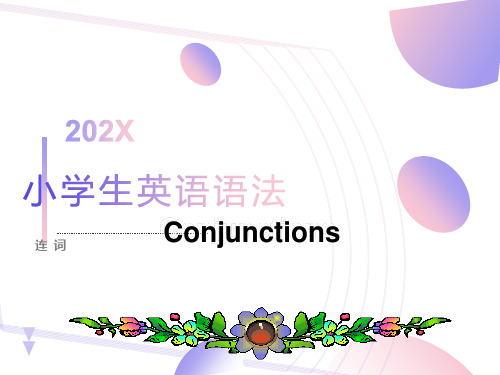
C__
pears?
12) Now we have no time
A. so
B. and
C___C__.
money. or
13) It’s getting warmer __ warmer.
A. and
B. butA
C. or
3.找出下列句中的错误,并予以订正。
1)Because he was hungry, so he ate two bowls of rice.
.
(but)
2)He broke his left leg. He couldn’t attend the meeting yesterday.
(because)
He couldn’t broke his left
attend leg.
the
meeting
yesterday,
Because
he
.
3)Bob entered the room. Bob took off the coat.
(努力学习,那么你的数学成绩将会很好)
Study hard, or your math will be worse.
(努力学习,否则你的数学成绩将会很差)
1.请用括号里的连词连接下列句子
1)He is rich. He is unhappy.
He is rich but he is unhappy
A. and
B. but
C. both A and B
10)This is my first lesson, C__ I don’t know your names.
A. and
B. but
C. so
2020年小升初六年级英语词类专项考点精讲+典题突破 专题08《连词》(通用版含答案)
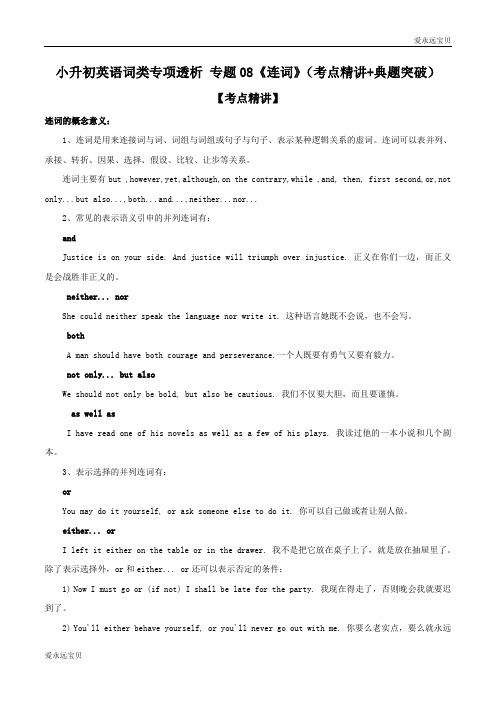
小升初英语词类专项透析专题08《连词》(考点精讲+典题突破)【考点精讲】连词的概念意义:1、连词是用来连接词与词、词组与词组或句子与句子、表示某种逻辑关系的虚词。
连词可以表并列、承接、转折、因果、选择、假设、比较、让步等关系。
连词主要有but ,however,yet,although,on the contrary,while ,and, then, first second,or,not only...but also...,both...and...,neither...nor...2、常见的表示语义引申的并列连词有:andJustice is on your side. And justice will triumph over injustice. 正义在你们一边,而正义是会战胜非正义的。
neither... norShe could neither speak the language nor write it. 这种语言她既不会说,也不会写。
bothA man should have both courage and perseverance.一个人既要有勇气又要有毅力。
not only... but alsoWe should not only be bold, but also be cautious. 我们不仅要大胆,而且要谨慎。
as well asI have read one of his novels as well as a few of his plays. 我读过他的一本小说和几个剧本。
3、表示选择的并列连词有:orYou may do it yourself, or ask someone else to do it. 你可以自己做或者让别人做。
either... orI left it either on the table or in the drawer. 我不是把它放在桌子上了,就是放在抽屉里了。
专题6.连词(小初考点差异及衔接)(原卷版)-2023年小升初英语精品衔接资料 师学科网资料】

连词(小初考点差异及连接)【学校连词考点聚焦】一.用or, and, but, so, because 完成句子。
1. Nick was very tired ________ he was very happy.2. His father never smokes ________ drinks.3. He is ill, he can’t go to school.4. Our classroom is clean ________ tidy.5. Lucy worked hard at English ________ she got first in the English exam.6. People can’t live without air ________ water.7. Hurry up, ________ we will be late.8. We can’t go out now, it is raining outside.9. I like drawing, ________ I don’t like singing.10. I like my mother ________ father.二1. I don’t like pork ________ beef.A. andB. orC. butD. so2. —Would you like to watch TV tonight?— I’d like to, ________ I have to do my homework.A. andB. orC. soD. but3. Put your coat on ________ you will be cold.A. andB. orC. soD. but【学校连词考点聚焦】考点清单考点一并列连词的用法并列连词是用来连接语法地位相同的单词、短语以及句子的连词。
并列连词主要分为表示并列关系、转折关系、因果关系及选择关系的并列连词。
小学生英语语法大全连词
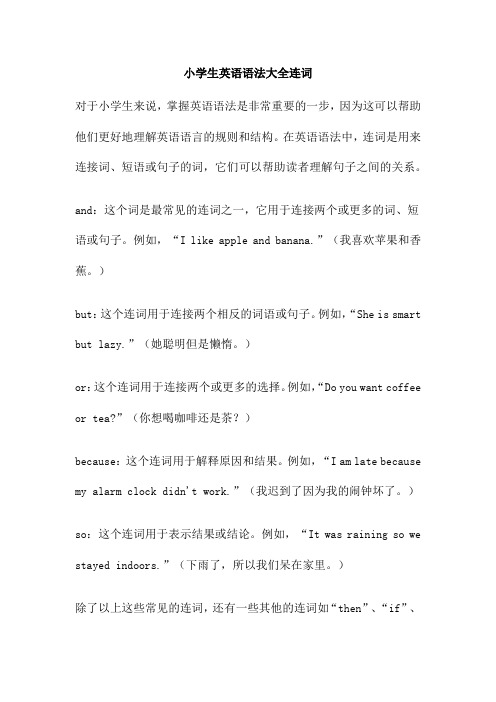
小学生英语语法大全连词对于小学生来说,掌握英语语法是非常重要的一步,因为这可以帮助他们更好地理解英语语言的规则和结构。
在英语语法中,连词是用来连接词、短语或句子的词,它们可以帮助读者理解句子之间的关系。
and:这个词是最常见的连词之一,它用于连接两个或更多的词、短语或句子。
例如,“I like apple and banana.”(我喜欢苹果和香蕉。
)but:这个连词用于连接两个相反的词语或句子。
例如,“She is smart but lazy.”(她聪明但是懒惰。
)or:这个连词用于连接两个或更多的选择。
例如,“Do you want coffee or tea?”(你想喝咖啡还是茶?)because:这个连词用于解释原因和结果。
例如,“I am late because my alarm clock didn't work.”(我迟到了因为我的闹钟坏了。
)so:这个连词用于表示结果或结论。
例如,“It was raining so we stayed indoors.”(下雨了,所以我们呆在家里。
)除了以上这些常见的连词,还有一些其他的连词如“then”、“if”、“when”、“where”等等。
这些连词都是非常有用的,可以帮助读者更好地理解英语句子和文章。
在学习英语语法时,小学生应该学会识别和使用这些连词。
他们可以通过阅读课文、练习册和写作来练习使用这些连词。
家长和老师也可以通过解释和示范来帮助他们更好地理解这些连词的作用和用法。
名词:表示人或事物的名称。
例如:book(书)、class(班级)、teacher(老师)。
动词:表示动作或状态。
例如:run(跑)、love(爱)、study(学习)。
形容词:用来描述名词或代词的性质或状态。
例如:happy(高兴的)、beautiful(美丽的)。
副词:用来描述动词、形容词或其他副词的程度或方式。
例如:quickly (快速地)、very(非常)、happily(快乐地)。
小升初英语连词知识点归纳

小升初英语连词知识点归纳连词是连接词语、短语和句子的词汇。
在英语中,连词起到连接句子成分、表达逻辑关系和构建复合句的作用。
一、并列连词 (Coordinating Conjunctions)1. and:表示添加、也、还有的意思。
如:I like apples and bananas.(我喜欢苹果和香蕉。
)2. but:表示但是、然而的意思。
如:She is smart, but she is lazy.(她很聪明,但她很懒。
)3. or:表示或者、还是的意思。
如:Do you want tea or coffee?(你要茶还是咖啡?)4. so:表示因此、所以的意思。
如:It was raining so I took an umbrella.(下雨了,所以我带了把伞。
)5. for:表示因为的意思。
如:She got an A for her hard work.(她因为努力工作得到了A。
)6. nor:表示也不的意思。
如:He can neither swim nor ride a bike.(他既不会游泳也不会骑车。
)7. yet:表示然而、但是的意思。
如:She is tired, yet she keeps working.(她很累,但她继续工作。
)8. therefore:表示因此、所以的意思。
如:He was sick, therefore he couldn't come to school.(他生病了,因此不能来上学。
)9. however:表示然而、但是的意思。
如:I want to go with you; however, I haveto work.(我想和你一起去,但是我得工作。
)10. moreover:表示而且、此外的意思。
如:She is talented; moreover, she is very hardworking.(她有才华,而且她非常努力。
小学六年重要知识点总结连词的用法与句子连接技巧详解
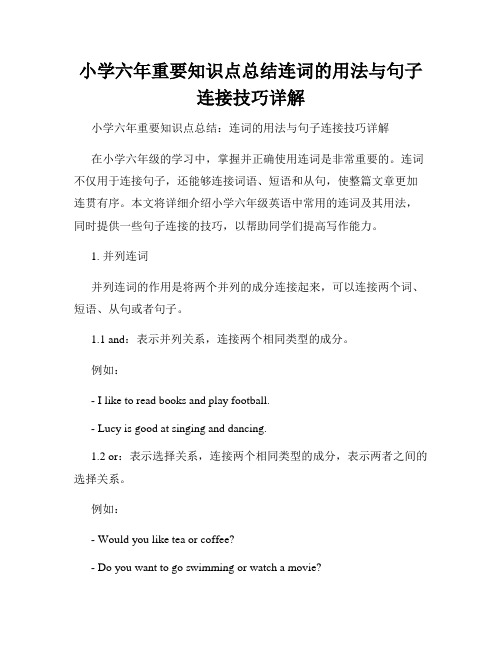
小学六年重要知识点总结连词的用法与句子连接技巧详解小学六年重要知识点总结:连词的用法与句子连接技巧详解在小学六年级的学习中,掌握并正确使用连词是非常重要的。
连词不仅用于连接句子,还能够连接词语、短语和从句,使整篇文章更加连贯有序。
本文将详细介绍小学六年级英语中常用的连词及其用法,同时提供一些句子连接的技巧,以帮助同学们提高写作能力。
1. 并列连词并列连词的作用是将两个并列的成分连接起来,可以连接两个词、短语、从句或者句子。
1.1 and:表示并列关系,连接两个相同类型的成分。
例如:- I like to read books and play football.- Lucy is good at singing and dancing.1.2 or:表示选择关系,连接两个相同类型的成分,表示两者之间的选择关系。
例如:- Would you like tea or coffee?- Do you want to go swimming or watch a movie?1.3 but:表示转折关系,连接两个相反或对比的成分。
例如:- He is smart but lazy.- It was raining heavily, but we still went to the park.2. 因果连词因果连词用于连接两个句子或短语,表示前后两个句子之间的因果关系。
2.1 because:表示原因,连接一个原因和结果。
例如:- I stayed at home because it was raining.- He couldn't sleep because the room was too noisy.2.2 so:表示结果,连接一个原因和结果。
例如:- It was raining, so we stayed at home.- He worked hard, so he passed the exam.3.条件连词条件连词用于连接条件与结果之间的关系。
连词(课件)下学期六年级下册英语人教PEP版
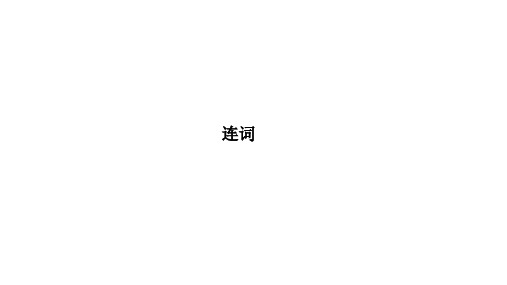
C.but then turn right at the cinema.
A.and
B.but
C.or
二、选择合适的连词填空。(可重复使用)
when because but before and after or so 1.How did you go there, by bus or on foot?
连词
用法
示例
表示时间,意为“在…… before 之前”。
Turn off the lights before you leave home. 在你离开家之前请关灯。
表示时间,意为“当…… when 时”。
I am doing my homework when my father gets home. 我爸爸回家的时候我 正在做作业。
I’m poor, but I always enjoy myself.
3.You will succeed(成功). You work hard. You will succeed if you work hard.
4.Tom is tall. Tom is strong. Tom is tall and strong.
You can be a scientist if you like if 表示条件,意为“如果”。 science. 如果你喜欢科学,你可以成
为一个科学家。
常见连词用法 单项选择。
( )1.I want three apples
A.but
B.and
( )2.The skirt is nice,
A.of
4.Tom was ill yesterday, but he still went to school.
2023年六年级英语小升初连词专题

连词一、概念二、连词是虚词, 起连接词与词, 短语与短语旳作用, 句子与句子旳作用。
三、小学阶段常见旳并列连词。
1、and 一般用在肯定句1)和, 并且(连接谓语时态、构造要一致)H.stoo.u.an.pu.o.hi.hat..他站起来,戴上他旳帽子。
I went to the Summer Palace and he went to the Forbidden City.我去了颐和园, 他去了紫禁城。
2)用在祈使句中。
Us.you.head, an.you’l.fin..way.动动脑筋, 你就会想出措施来。
2.or 或者, 否则1)否认句I don’t like playing basketball or playing football。
我不喜欢打篮球和踢足球。
1)疑问句Which do you prefer, coffee or coke? 你喜欢喝咖啡, 还是可乐?Is your English teacher a man or a woman?你旳英语老师是男旳老师还是女旳老师?but 不过表达转折, 一般用于否认句。
H.like.th.pian.bu.doesn’.lik.th.violin.他喜欢钢琴,但不喜欢小提琴。
so 因此表到达果。
(注意: so不能和because 并列使用)Th.ca.wa.hungry.s..gav.i.som.food.猫饿了,因此我给了它某些食物。
Becaus.th.ca.wa.hungry,.gav.i.som.food.由于猫饿了,我给他某些事物。
3、both…and…和;既……也……Bot.Beijin.an.Ne.Yor.hav.traffi.problems.北京和纽约均有交通问题。
4、either…or…或……或……不是……就是……Eithe.yo.o.h.i.right. 不是你就是他是对旳。
5、neither…nor…既不……也不……三、nguage. 他和我都不会说外语。
小学六年级英语《连词》复习教学课件
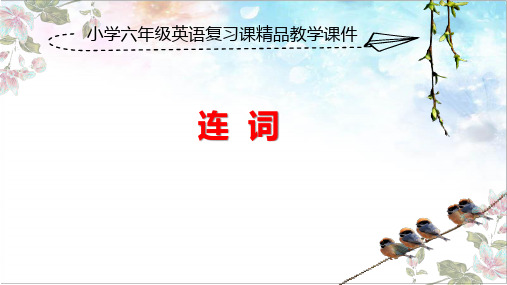
Do you like the yellow one or the red one?你喜欢黄色的还
是红色的?
课堂练习:单项选择。
C
1.________ I have a toothache,________ I want to see the dentist (牙医).
friends.In autumn, the days get shorter and the nights get longer.It's often sunny, but not too
hot.I like winter best.In winter, the days are short and the nights are long.It's not very cold.I
小学六年级英语复习课精品教学课件
连词
复习目标: 1.能了解连词的定义及分类。 2.能熟练掌握连词的各种用法。 3. 课堂过关训练。
连词是一种虚词,不能独立承担句子成分,它只起连接词与词、短语
与短语以及句子与句子的作用。小学阶段常见的连词有:and,but,
so,for,or等。
分类 并列关系 both…and 既……又…… Both Lily and Lucy are students.莉莉和露西都是学
五、阅读短文,选择确答案。
It's warm in spring.The trees turn green and the flowers start to grow.I often go boating in
小学英语连词
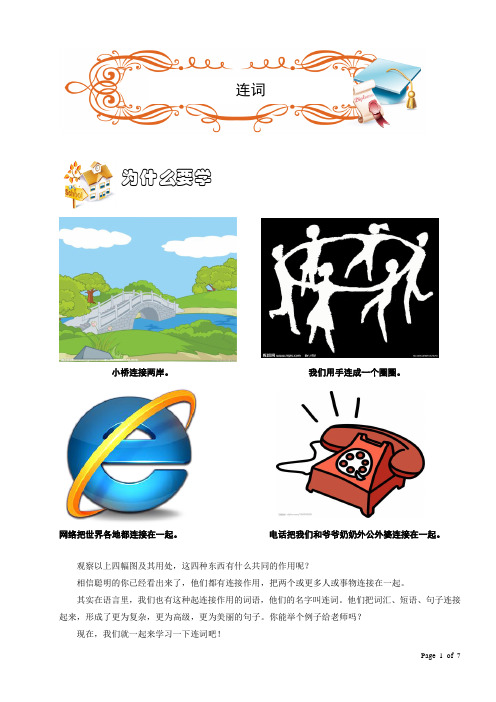
连词为什么要学小桥连接两岸。
我们用手连成一个圈圈。
网络把世界各地都连接在一起。
电话把我们和爷爷奶奶外公外婆连接在一起。
观察以上四幅图及其用处,这四种东西有什么共同的作用呢?相信聪明的你已经看出来了,他们都有连接作用,把两个或更多人或事物连接在一起。
其实在语言里,我们也有这种起连接作用的词语,他们的名字叫连词。
他们把词汇、短语、句子连接起来,形成了更为复杂,更为高级,更为美丽的句子。
你能举个例子给老师吗?现在,我们就一起来学习一下连词吧!我要赶快学一、定义连词是一种虚词,它不能独立担任句子成分而只起连接词与词,短语与短语以及句与句的作用。
二、连词的分类连词分为并列连词和从属连词。
(一)并列连词并列连词用来连接具有并列关系的词,短语或句子。
常见的并列连词有:1.表并列关系的and, both…and, not only…but also, neither…nor等。
I like swimming, and my mother likes swimming, too.(连接两个句子)Both my mother and I like swimming. (连接两个并列关系的词语)Not only my mother but also I like swimming. (连接两个并列关系的词语)I want neither going to school nor doing homework. (连接两个短语)2. 表选择关系的or, either…or等。
Do you like apples or bananas?Either you or Jack must come here tomorrow.除了表示选择关系外,or还有“否则”之意。
Hurry up, or you’ll be late for school.3. 表转折关系的but, yet, while(然而)等。
The watch was cheap, but it goes quite well. 这块表虽然便宜, 但走得很好。
小学英语语法教案:连词

小学英语语法教案:连词【知识点讲解】1. 并列连词用来连接有并列关系的词.短语或分句的连词。
见的并列连词有:1). 表并列关系的and, both…and, not only…but also, neither…nor等。
and和, 并且; 这样的话,就会……例:He’s big and tall. 他很高大。
My uncle lives and works in Shanghai. 我叔叔在上海居住和工作。
Study hard, and you can get good grades.努力学习, 这样的话, 你就会取得高分。
(If you study hard, you can get good grades.)both …and既……又……例:The boy is both tall and fat. 那个男孩又高又胖。
Both New York and London have traffic problems. 纽约和伦敦都存在交通问题。
not only...but (also) 不但…而且…,不仅…还…例:My daughter can not only sing but also dance.我的女儿不仅能唱,还会跳。
Not only the students but also their teacher is enjoying the film.不仅学生们在欣赏这部影片,他们的老师也在欣赏这部影片。
(注意:谓语动词单复数采用就近原则)neither...nor, 既不…也不…例:She likes neither butter nor cheese. 她既不喜欢黄油也不喜欢乳酪。
Neither Jim nor Jack was at home. 吉姆和杰克都不在家。
(注意:谓语动词单复数采用就近原则)2). 表选择关系的or, either…or…等。
or 或(疑问句中);或(否定句中);否则例:Are you a teacher or a student? 你是老师还是学生?You can take some food or some money.你可以带点吃的或带点钱。
完整版六年级英语小升初连词专题
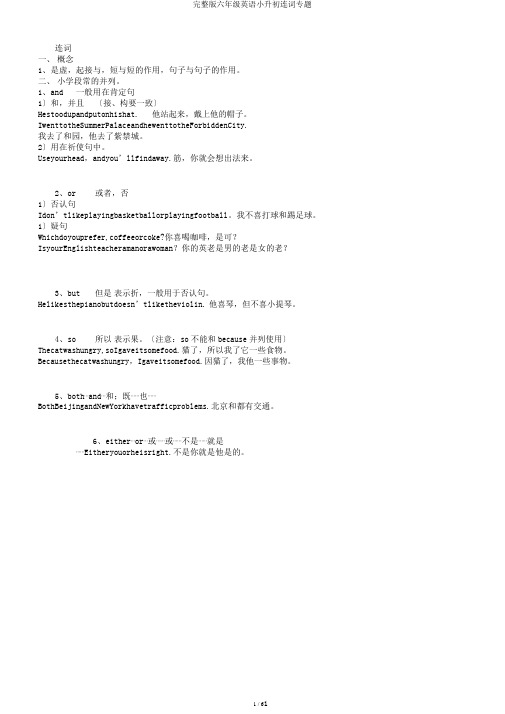
连词一、概念1、是虚,起接与,短与短的作用,句子与句子的作用。
二、小学段常的并列。
1、and 一般用在肯定句1〕和,并且〔接、构要一致〕Hestoodupandputonhishat. 他站起来,戴上他的帽子。
IwenttotheSummerPalaceandhewenttotheForbiddenCity.我去了和园,他去了紫禁城。
2〕用在祈使句中。
Useyourhead,andyou’llfindaway.筋,你就会想出法来。
2、or 或者,否1〕否认句Idon’t likeplayingbasketballorplayingfootball。
我不喜打球和踢足球。
1〕疑句Whichdoyouprefer,coffeeorcoke?你喜喝咖啡,是可?IsyourEnglishteacheramanorawoman?你的英老是男的老是女的老?3、but 但是表示折,一般用于否认句。
Helikesthepianobutdoesn’tliketheviolin.他喜琴,但不喜小提琴。
4、so 所以表示果。
〔注意:so不能和because并列使用〕Thecatwashungry,soIgaveitsomefood.猫了,所以我了它一些食物。
Becausethecatwashungry,Igaveitsomefood.因猫了,我他一些事物。
5、both⋯and⋯和;既⋯⋯也⋯⋯BothBeijingandNewYorkhavetrafficproblems.北京和都有交通。
6、either⋯or⋯或⋯⋯或⋯⋯不是⋯⋯就是⋯⋯Eitheryouorheisright.不是你就是他是的。
7、neither⋯nor⋯既不⋯⋯也不⋯⋯NeitherhenorIspeakaforeignlanguage.他和我都不会外。
三、附属的分及用法1、that引从句〔可以省略〕Hesays(that)hehastoldherthething. 他他已告了她件事了。
小学英语连词成句题型讲解
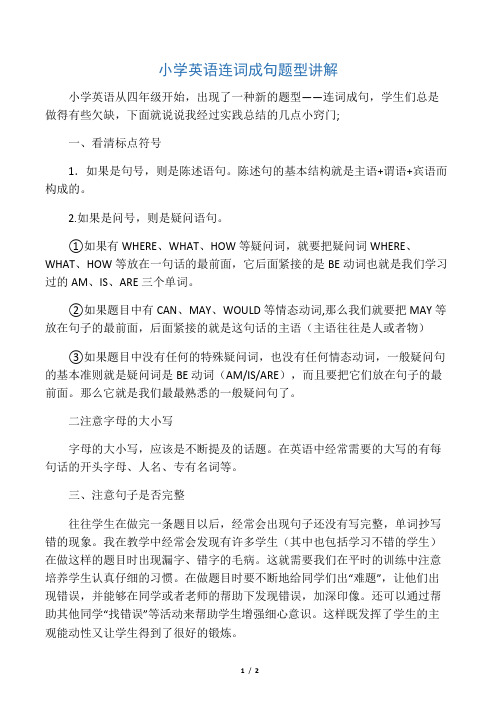
小学英语连词成句题型讲解小学英语从四年级开始,出现了一种新的题型——连词成句,学生们总是做得有些欠缺,下面就说说我经过实践总结的几点小窍门;一、看清标点符号1.如果是句号,则是陈述语句。
陈述句的基本结构就是主语+谓语+宾语而构成的。
2.如果是问号,则是疑问语句。
①如果有WHERE、WHAT、HOW等疑问词,就要把疑问词WHERE、WHAT、HOW等放在一句话的最前面,它后面紧接的是BE动词也就是我们学习过的AM、IS、ARE三个单词。
②如果题目中有CAN、MAY、WOULD等情态动词,那么我们就要把MAY等放在句子的最前面,后面紧接的就是这句话的主语(主语往往是人或者物)③如果题目中没有任何的特殊疑问词,也没有任何情态动词,一般疑问句的基本准则就是疑问词是BE动词(AM/IS/ARE),而且要把它们放在句子的最前面。
那么它就是我们最最熟悉的一般疑问句了。
二注意字母的大小写字母的大小写,应该是不断提及的话题。
在英语中经常需要的大写的有每句话的开头字母、人名、专有名词等。
三、注意句子是否完整往往学生在做完一条题目以后,经常会出现句子还没有写完整,单词抄写错的现象。
我在教学中经常会发现有许多学生(其中也包括学习不错的学生)在做这样的题目时出现漏字、错字的毛病。
这就需要我们在平时的训练中注意培养学生认真仔细的习惯。
在做题目时要不断地给同学们出“难题”,让他们出现错误,并能够在同学或者老师的帮助下发现错误,加深印像。
还可以通过帮助其他同学“找错误”等活动来帮助学生增强细心意识。
这样既发挥了学生的主观能动性又让学生得到了很好的锻炼。
还有一些连词成句的题目看上去似乎是无规律可循。
怎么去做呢?这些句型在平时的联系中要多掌握一些固定短语的使用比如:GOTOSCHOOL,GOSHOPPING,PUTON,TAKEOFF等等。
六年级下英语知识点-2019小升初专题总复习 第七章 连词成句与句型转换 全国通用

第七章连词成句与句型转换连词成句与句型转换综合考查学生对陈述句、疑问句、祈使句、感叹句四种句型的综合运用能力。
大部分考题来源于课本,要求学生对课本内容十分熟悉。
考点一连词成句解题步骤与解题技巧看清标点符号。
1.如果是句号,则是陈述语句。
陈述句的基本结构是“主语+谓语+宾语”。
2.如果是问号,则是疑问语句。
要先看是特殊疑问句还是由“情态动词”引导的疑问句:(1)如果句中有where/what/who/whose/when/how等疑问词,那么它就是特殊疑问句。
方法:将where/what/how等疑问词放句首+be动词(am/is/are或者其过去式was/were)……(2)如果句中有can/may/shall/would等情态动词,那么它就是由情态动词引导的疑问句。
方法:将can/may等情态动词放在句首+句子主语……(3)如果句中没有任何特殊疑问词,也没有任何情态动词,那么它就是一般疑问句。
方法:将“be”动词或助动词(do/does/did)放在句首+句子主语……考点二解题技巧的具体运用在做此类题目时,除熟练掌握以上技巧外,还有下列两点需要注意。
其一:注意句子是否完整。
其二:注意字母的大小写。
每句话开头的字母大写。
如:1.如果是句号(句点),则是陈述语句:driver father a is bus her.→Her father is a bus driver.2.如果是问号,则是疑问语句。
the in woman who white is?→Who is the woman in white?have I a may new bike?→May I have a new bike?3.句中既无特殊疑问句也无助动词时,为一般疑问句。
you a are student?→Are you a student?考点三句型转换专题1.一般疑问句:是指询问事实的句子,此类句子必须用“Yes/No”来回答。
2024年冀教版英语六年级上册Lesson 7-优课件
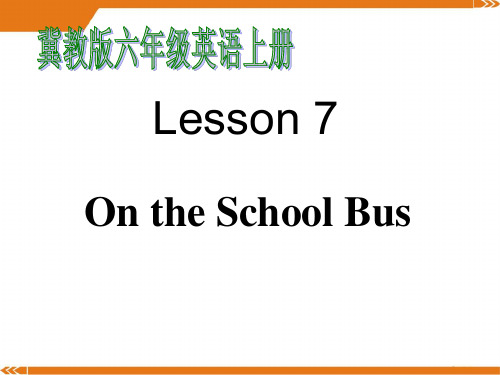
绩 ,
八
分
方
法
。
愿
全
天
下
所
有
父
母
我们,还在路上……
• I ofen go to school by bus.
四.拓展练习
你知道“driver”的动词形式吗?
drive
都二
能分
运浇
用灌
好,
“八
二分
八等
定待
律;
”二
,分
我管
们教
一,
起八
,分
静放
待手
花;
开二
。分
成
➢ Pure of heart, life is full of sweet and joy!
Lesson 7
On the School Bus
二、检查预习情况
1.我找到的四个频度副词
always
sometimes
总是
有时
often
常常
never
从不
Sunda Mond- Tuesd Wedn- Thurs- Friday Saturd
-y
ay -ay esday day
-ay
Danny donut donut donut donut donut donut donut
sandJenny wich
sand- sandwich wich
sandwich
Steve n
Li M -ing
porridge
porridge
Danny always eats breakfast . Jenny ofen eats breakfast. Steven sometimes eats breakfast . Li Ming never eats breakfast .
- 1、下载文档前请自行甄别文档内容的完整性,平台不提供额外的编辑、内容补充、找答案等附加服务。
- 2、"仅部分预览"的文档,不可在线预览部分如存在完整性等问题,可反馈申请退款(可完整预览的文档不适用该条件!)。
- 3、如文档侵犯您的权益,请联系客服反馈,我们会尽快为您处理(人工客服工作时间:9:00-18:30)。
第7讲连词(一)连词1. 定义:起连接作用,连接名词,形容词,短语,或句子的词叫连词,2. 常用连词有:and, but, so .or ,for, when,if,because等。
(二)and用法;1. 前后连接两个以上的相似结构。
(1)两个并列的动词:We were singing and dancing all evening.整个晚上我们都在唱歌跳舞。
(2). 名词、形容词等:This apple is big and red.这个苹果又大又红。
(3). 两个并列的分句(句子):I said it and I meant it.我说话算数。
2. and 可连接两个分句,表示递进关系。
Give him an inch and he will take a mile.他会得寸进尺。
3.句型:祈使句+and(句子用一般将来时)Buy your mother an unexpected gift,and she will be very happy.给你妈妈买一个意想不到的礼物,她会非常开心的。
Use your head , and you will have an idea.动动脑筋,你就会有主意了。
(三)or的用法1. 连接两个以上的相似结构“或者”“还是”(1)动词:He will have dinner with his grandparents or stay at home.他或者是去陪祖父母吃饭,或者是呆在家里。
(2)名词He often has eggs or hamburgers for breakfast.他早饭或者是吃汉堡,或者是吃鸡蛋。
(3)形容词Is his new car blue or red?他的新车时红色的还是蓝色的?2. 连接两个句子“否则”“不然”句型:祈使句+or(句子用一般将来时)Study hard when you are at school ,or you will have a difficult future.上学的时候好好学,不然你的将来会很困难。
. Hurry up, or you will miss the bus.快点,否则你会赶不上汽车的。
3. Or与and(1)连接相似结构时,and不能用于否定,而要用or来代替。
I like singing and dancing.我喜欢唱歌也喜欢跳舞。
I don’t like singing or dancing.我不喜欢唱歌也不喜欢跳舞。
(2)连接句子时,and表示前后两句话是顺承的关系,而or表示前后是转折关系。
Study hard and you will study well.努力学,你就会学好。
Study hard or you will study bad.努力学,否则你就学不好。
(四)but用法1.常用于连接两个句子,表示转折。
“但是”,“却”的意思。
不能与though /although连用,只可单独使用。
It is raining outside, but he still keep running.外面下着雨,但是他还坚持跑步。
This movie is very famous but I don’t like it.这部电影很有名气但是我不喜欢。
2. but也可以用于连接两个同类性质的词This dress is very beautiful but expensive.这件裙子很漂亮但是很贵。
3. Not...but....不是.....而是.....This coat is not hers but mine.这件大衣不是她的,而是我的。
Tom is not reading but playing in his room.Tom 不是在读书而是在房间里玩呢。
(五)for的用法for可以表示"因为",但引导的不是从句,而是并列分句,对前面情况加以解释,常用逗号把它和前面的分句分开,这在书面语中比较多见。
The days were short, for it was now December.白天很短,因为现在已经是十二月。
She must have gone out early, for she had not come for breakfast.她肯定一早出去了,因为她没来吃早饭。
I soon went to sleep ,for(because)I was tired.我很快就睡着了,因为我累了。
(六)so表示结果,可译为"因此"、"所以"。
(不能和because 连用)Our cases were heavy, so we took a taxi.我们的箱子很重,因此我们坐了出租车It began to rain , so I had to stay here.开始下雨了,所以我只好留在这里。
(七)Because的用法1. Because 后加原因,不与so连用,可以回答why的提问。
---why didn’t you come to school yesterday ?---because I had to look after my sister.你昨天为什么没来学校?因为我得要照看我的妹妹。
I was late for work ,because the traffic was too heavy this morning.我今天上班迟到了,因为太堵了。
2. Because 与because of,Because 后加句子,而because of 后加名词Because the weather is bad ,we must stay at home.Because of the bad weather ,we must stay at home.因为天气不好,我们得呆在家里。
(八)if 的用法1. 表示假设的一种条件,“如果”“假如”,在这种条件下,会有什么样的结果。
What shall we do if it snows tomorrow?如果明天下雪,我们要做什么呢?If he comes tomorrow, I will tell him this news.如果明天他来了,我会告诉他这个消息的。
2. 在if的句子中,谓语动词通常用现在时态表示将来的动作或状态。
(主将从现)I’ ll help you with your English if am free tomorrow.如果我明天有空闲的话,我会帮你学英语的。
(九)when的用法1. 表示一件事情发生的时候,另外一件事情也在发生。
“当........的时候”It was raining hard(rain hard 下大雨)when got to school yesterday.当我昨天去上学的时候,雨下的特别大。
(下雨和去学校两个动作是同时的)When my mother was sleeping ,I was reading in my own room .妈妈在睡觉的时候,我在房间里看书。
(十)before与after1. Before “在......之前”;after”在.......之后,后面加一个时间点My father get home before six o’ clock every evening.爸爸每天六点前就到家了。
He went to bed after twelve o ‘ clock last night.他昨天晚上12点后睡的觉。
2. 后面加句子,表明在做完一件事情之前或之后做了另一件事情。
He had learned a little Chinese before he came to China.他来中国之前学过一点汉语。
After he finished middle school, he went to work in a factory.他中学毕业后,去了一家工厂工作。
1、了解连词,掌握连词的作用2、能用基本的连词写出并列句1.---I like riding fast. It’s very exciting.---Oh! You mustn’t’t do it like that, ________ it may have an accident.A. andB. orC. soD. but答案:B解析:该题考查的是并列连词的用法。
答语的意思是“你不要那样做,否则会发生事故的。
”在这四个并列连词中,只有or含有这样的意思,所以应选B。
2. John fell asleep ________ he was listening to the music.A. afterB. beforeC. whenD. because答案:C解析:该题考查的是引导时间状语从句的常用从属连词的用法。
本句的含义是“约翰在听音乐的时候睡着了。
”表示在干某事时发生了某个事情”通常用when。
因此应选C。
3. —How can I wake up so early?—Set the alarm at 5 o’clock, ________ you’ll make it.A. butB. orC. andD. so答案:C.解析: 考查“祈使句+and+陈述句”句型,意为“如果…就…”。
虽然or也可用于此句型,但or是“否则、要不然”之意,如:Work hard, or you’ll fail. (努力学习,否则就会不及格。
)4. ________ I walked for six hours, I was tired out.A. AfterB. BeforeC. WhenD. if答案:A。
解析; 本题考查以after引导的时间状语从句,意为“在…之后”。
句意为“步行了六小时后,我累坏了”。
5. The roof fell ________ he had time to dash into the house to save his baby.A. asB. afterC. untilD. before答案:D解析: 本题考查before引导的时间状语从句,意为“在……之前”。
句意为“他来不及冲进去救他的孩子,屋顶就塌了”。
6.. Don’t drink too much tea in the evening, ____ you won’t fall asleep.A. AndB. soC. OrD. but答案; C解析;此题考查连词or的用法,表示或者。
晚上不要喝太多的茶,否则你会睡不着的。
A档( )1. He can speak English_______ Chinese.A. butB. alsoC. soD. and( )2. Physics is not so easy, _______I like it very much.A. butB. orC. since D . Because( )3. Will Tom wait for her at home ______ at the libraryA. orB. asC. so thatD. both( )4. She has a son _______ a daughter.A. ButB. andC. soD. or( )5. I'll give her the gift ______ she arrives.A. soB. beforeC. whenD. since( )6. ______we got home it was very late.A. WhenB. WhileC. BecauseD. ifB档( )1. You should finish your lessons _______ you go out to play.A. beforeB. afterC. whenD. while( )2. We were swimming in the lake ____suddenly the storm started .A. whenB. while C until D . before( )3.He took off his coat _______ he felt hot.A. becauseB. asC. ifD. since( )4. I was late for class yesterday _______ there was something wrong with my bike.A. whenB. thatC. untilD. because( )5. We will stay at home if my aunt ________ to visit us tomorrow.A. comesB. comeC. will comeD. is coming( )6. ---Do you know if he _______ to play basket ball with us?---I think he will come if he ______ free tomorrow.A. comes; isB. comes; will beC. will come; isD. will come; will beC档阅读理解(1)“The history of York(约克) is the history of England.”King George VI(乔治六世) said. York was first built in A.D. 71, and it has a rich and long history of more than 1, 900 years. Its history makes it one of the most popular cities for visitors in England. People can hear a lot about England’s history and they can see it and walk in it. Thousands of people from different countries take a walk through 1, 900 years of history on York’s city walls. “York is a great city with many special buildings, old city walls and a famous university(大学)—York University. Besides(此外), it has interesting shops and many fine restaurants. It’s both old and modern. I really love it.”said Jack Smith, a visitor from the U.S.A.It’s really easy to come to York. York is between London and Edinburgh(爱丁堡), the capital of Scotland(苏格兰). You can take a train from London to York. If you have enough time, you can also take a bus from London to go through Cambridge(剑桥) to York. Come and find out more about York’s history!( ) 1. How many years of history does York have?A. Less than 1, 900 years.B. Only 71 years.C. Less than 71 years.D. Over 1, 900 years.( ) 2. Where is York? It’s .A.in CambridgeB.in ScotlandC.in EnglandD.in the U.S.A.( ) 3. What did Jack Smith think of York?A. Very boring.B. Very interesting.C. There is nothing to see.D. A little scary.( ) 4. What does the sentence underlined(下画线) mean?A. You can learn nothing about the history of England in York.B. Both York and England have short history.C. You can learn much about the history of England in York.D. York is the only place in England.( ) 5. From the passage, we know that is the right map.(2)(2)We often hear a lot of people drink wine (酒) .Do you hear of the ox (牛) can drink wine? The farmer is offering (提供) the ox some wine. Is it very strange? It is said that it can not do farm work without drinking wine.We saw the big yellow ox on a farm at last. The villagers told us that the ox was about 500 jin weight. “We can’t find out another ox like it in our hometown,”and old farmer said. The partner of the ox is Mr. Liu who comes from Guizhou. Mr. Liu comes here to make money. He told us he had worked with the ox on this farm for five years. The farm is very big, and the boss(老板) bought this ox from Taiwan. All the farm work was done by the ox, but now it can do some of them. “We must give the ox some wine to drink or he can’t work.”Mr. Liu said and took out a bottle of wine. When the ox saw the wine, he became very excited. A few minutes later, he drank up all the wine in the bottle. But the ox looked at the empty bottle and it seemed that it was not enough.“I like drinking the wine,”Mr. Liu told us, “and I can drink two bottles.”We found the wine for the ox was better than that for Mr. Liu. “Why do you drink such bad wine?”we asked. Mr. Liu laughed, “I must pay for it myself if I want to drink. But the ox drinks wine from the boss. One day, one bottle. The boss must buy some boxes of wine for the ox to work for him. ”( )6. The ox can not work without ________ according to this passage.A. drinking waterB. eating grassesC. having restD. drinking wine( )7. The ox’s partner _______ from Guizhou and worked on a farm with the ox.A. cameB. learnedC. heardD. got( )8.Mr. Liu came to the big farm to ________ .A. take care of the oxB. help the ownerC. make moneyD. do the housework( )9. When the ox saw the wine in Mr. Liu’s hand, it became very ________.A. angryB. excitedC. sadD. worried( )10. Mr. Liu’s wine is ________ than that of the ox.A. betterB. worseC. lessD. more( )1.He didn’t’t come to school yesterday ,____he was ill.A. ifB. becauseC. whenD. before( )2. I have to finish the work now ____ I will fall behind others.A. andB. orC. butD. so( )3. D o you prefer apples ____ grapes?A. toB. thanC. OrD. so( )4. I met Miss Green ____ I was walking across the bridge, but I did not say hello to him.A. beforeB. afterC. untilD. when( )5. I can not afford to buy a CD player ____ it is too expensive.A. afterB. thoughC. becauseD.until( )6. I would like to play football with you ____ I have got a meeting now.A. andB. orC. butD. so( )7. You should make a plan ____ you do anything important.A. beforeB. afterC. thoughD. until( )8. Forests help to keep water from running away, ____ drought does not often happen.A. andB. butC. soD. though( )9. We all like Han Mei ____ she is kind and helpful.A. soB. andC. becauseD. but( )10. ______we got home it was very late.A. WhenB. WhileC. BecauseD. As( )11. It was so late, ____ the farmers went on working in the field.A. andB. orC. soD. but( )12. The little boy is only six years old, ____ he can make model wonderful cars.A. butB. soC. orD. and( )13. Shirley has passed the exam ____ she is busy with her hard work.A. becauseB. whenC. sinceD. though( )14. Linda was just going out shopping ____ the telephone rang.A. whileB. whenC. afterD. because( )15. I bought a present for my friend, ____ she did not like it at all.A. AndB. but C . so D. or一.连词练习( )1. Hurry up! ____ you will be late for the film.A. AndB. ButC. OrD. Because( )2. The doctors tried their best to save the patient’s life ____ failed.A. orB. soC. butD. because( )3. Study hard _____ you are sure to have a good result.A. orB. andC. forD. but( )4. Sam was reading a newspaper ____ his brother fell on the ground.A. whenB. whetherC. as soon asD. but( )5. Jack is only four years old, ____ he can draw beautiful pictures.A. butB. soC. orD. since二.阅读理解(1)In 1826, a Frenchman named Niepce needed pictures for his business. But he was not a good artist. So he invented a very simple camera(照相机). He put it in a window of his house and took a picture of his garden. That was the first photo.The next important date in the history of photography (摄影术) was in 1837. Thatyear ,Daguerre, another Frenchman, took a picture of his reading room .He used a new kind of camera in a different way. In his picture you could see everything very clearly, even the smallest thing. This kind of photo was called a Daguerreotype.Soon, other people began to use Daguerre’s way. Travelers brought back wonderful photos from all around the world. People took picture of famous buildings, cities and mountains. In 1840, photography was developed. Then photographers could take picture of people and moving things.That was not simple. The photographers had to carry a lot of film and other machines. But this did not stop them, for example, some in the United States worked so hard.Mathew Brady was a famous American photographers. He took many picture of great people. The picture were unusual because they were very lifelike(栩栩如生的).Photographers also became one kind of art by the end of the 19th century. Some photos were nor just copies of the real world. They showed feelings, like other kinds of art.()6.The first photo taken by Niepce was a picture of ____________A.his businessB. his houseC. his gardenD. his window( )7.The Daguerre type was____________.A. a FrenchmanB. a kind of pictureC. a kind of cameraD. a photographer( )8.If a photographer wanted to take pictures of moving things in the year of 1840j, he had to__________.A. watch lots of filmsB. buy an expensive cameraC. stop in most citiesD. take many films and something else with him.( ) 9. Mathew Brady______________.A.was very lifelikeB. was famous for his unusual picturesC. was quite strongD. took many pictures of moving people( )10.This passage tells us_____________.A. how photography was developedB. how to show your ideas and feelings in picturesC. how to take pictures in the worldD. how to use different cameras(2)A lady who never gave upShe was a poor girl who worked to get money to pay for her lessons. She became the famous woman scientist of her time. That’s the story of Marie Curie’s life. She didn’t’t mind working and she didn’t’t care about the honors(荣誉) that were given to her in later years.Marie was born in 1867. Her name was Marie Sklosovska then. She live in Poland. Her father was a teacher. Everyone soon saw that Marie had a quick mind.Marie’s mother died when her youngest daughter was only ten. From then on, Marie knew that she would have to work hard at her lessons if she wanted to be successful(成功的) in her life. She studied very hard and was one of the best students at her school.Marie and her older sister, Bronya, wanted to study in France at the Sorbonne. But their father didn’t’t have enough money to send them there. It was Marie who had an idea: she would teach at home and send her money to Bronya. After her sister finished studying in Paris, she would get work and send Marie the money to study there herself. So Marie worked very hard for six years to pay for her sister’s studies. At last it was Marie’s turn but when she got to France, her sister was married and could not give her much help.Again Marie worked. She studied in a small room without heat or light. She lived on bread and tea most of the time. But all she thought of was her maths and science. This was her world.After four years’hard work, Marie and her husband found something which was called radium(镭). They were given the Nobel Prize(诺贝尔奖) for their great discovery(发现). But they were too ill to go Stockholm themselves to receive it.Marie always said that it was because if her children that she want her work. And she discovered a hidden power and gave it to the world. It was the same power, however, that killed Marie in 1934.( )11. Marie Sklodovska was born in _______.A. FranceB. PolandC. Stockholm( )12. Marie did not go to Paris with her sister because ______.A. she did not want toB. she always thought of her maths and science first.C. She had to earn money to pay for her sister’s study.( )13.She received her higher education (教育) at _____.A. PolandB. StockholmC. the Stockholm( )14.In Paris Marie had to live on bread and tea because_______.A. she had no timeB. she had to support her sisterC. her sister could not give her much help( )15. The greatness(伟大) of Marie’s life in the fact that_______.A. she received two Nobel PrizesB. she was the first woman to work at the SorbonneC. she worked hard without taking care of the fame and honors she received课程顾问签字: 教学主管签字:。
